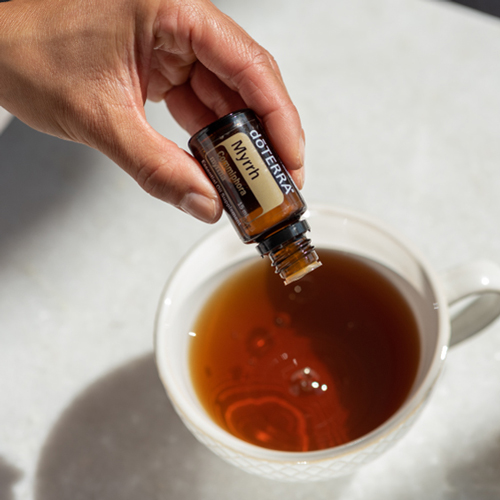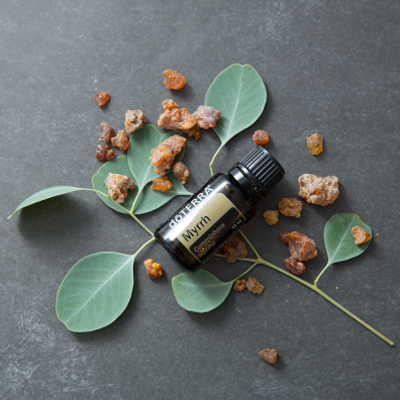Origen: un derivado latino.
Significado "regalo de la tierra."
-
Compra
- Ver Compra Inicio
- Bienestar Fundamental
- Nuevos Productos
- All Products
- Aceites Esenciales
- MetaPWR
- Guía Navideña doTERRA 2024
- Línea Abode
- Cuidado Personal
- Protección Solar
- Suplementos
- Kits y colecciones
- Literatura
- Ofertas especiales
- Difusores y Accesorios
- FSA/HSA Eligible Products
- doTERRA Healing Hands
-

-
Nuestra Historia
- Ver Nuestra Historia Inicio
- Lo que hacemos ...
- Lo que hacemos ...
- Porque lo hacemos ...
-
dōTERRA[doh-teh-ruh]
Myrrh Oil Uses and Benefits
Essential Oil Spotlight
Essential Oil Spotlight


Myrrh Oil Product Description
Because of its effectiveness and versatility, myrrh has been valued across many cultures for centuries. With countless applications, it was used anciently for everything from wellness practices to religious purposes.
Today, myrrh tree resin is transformed into an herbaceous, woody essential oil that captures all the resin’s stunning benefits. Whether you want to promote smooth, youthful-looking skin or enjoy a balancing aroma, Myrrh is an indispensable addition to your essential oil collection.
Where to Buy Myrrh Oil
Many historical myrrh uses are still applicable today. Visit our Myrrh product page and order a bottle of your own to experience the incredible benefits for yourself.

Buying essential oils from doTERRA means you know each bottle is safe to use around your loved ones. doTERRA is a trusted source for essential oils, producing pure, potent products that provide people worldwide with countless benefits.
Myrrh Essential Oil Uses and Benefits
- Myrrh is widely known for its mouth-cleansing properties. Incorporate it into your daily oral hygiene routine by adding one or two drops to your toothpaste. Or combine one drop of Myrrh with two ounces of water for an effective mouth rinse. Gargle the rinse for 30 seconds for an extra clean feeling.
- Myrrh also promotes a youthful-looking complexion and soothes the skin. Add one or two drops to your daily lotion or moisturizer to help reduce the appearance of fine lines and wrinkles.
- Myrrh can benefit your nails when added to a lotion or cream. If your cuticles are dehydrated, try this DIY Cuticle Cream. With four simple ingredients—shea butter, beeswax, doTERRA Fractionated Coconut Oil, and Myrrh essential oil—your nails will soon find relief. This DIY can also be used on the hands, lips, or any dry skin.
- Try diffusing Myrrh when you want to create a balanced atmosphere. Myrrh is a popular essential oil to diffuse during the holidays because it provides a soothing, balancing aroma throughout the home.
- The soothing benefits of Myrrh are perfect after shaving. Avoid irritated skin with this easy DIY Razor Relief Serum, which features some of the best essential oils for the skin, including Frankincense, Lavender, Tea Tree, Helichrysum, and Myrrh to help calm the skin and diminish irritations after a shave. The lovely scent created by this essential oil combination will linger on your skin and soothe razor bumps every time you shave, whether you’re a man or woman.
- Sometimes you just need to have an at-home spa night. Mix two or three drops of Myrrh with doTERRA spa Hand Lotion to moisturize callused or dry feet. You can also mix Lemon, Frankincense, and Myrrh (10 drops of each) with doTERRA Fractionated Coconut Oil to help soften cuticles. Check out our DIY recipes for more at-home spa treatments!
Fun Fact
In Arabic, the word myrrh means bitter.
Plant Description
Native to regions in Africa and Arabia, Commiphora myrrha is a small tree that produces sap that hardens into resin. Typically a thorny tree or shrub, the myrrh tree produces few leaves and has rugged, angled branches.
When the myrrh tree is harvested, it bleeds the tree sap, which then turns hard and glossy. Myrrh resin is then steam-distilled into an essential oil with a dry, woody aroma. It’s been used since ancient times for wellness, perfumery, incense, religious purposes, and burials.

Chemistry of Myrrh Essential Oil
Main chemical components: furanoeudesma, 1,3-diene, curzerene
Because of its chemical makeup, Myrrh may help cleanse and improve the appearance of skin. The sesquiterpene ethers in the essential oil are known for their soothing properties. One of the primary sesquiterpene ethers in Myrrh, curzerene, is commonly added to skincare products because of its ability to improve the skin’s appearance.
Essential Oils That Blend Well with Myrrh
Myrrh can be categorized as a wood oil. Its smoky, dry aroma is unique, but its woody and herbaceous notes help it blend well with spice, floral, or citrus oils.
Try blending Myrrh with any warm, spicy essential oil like Frankincense, Sandalwood, or Clove. For a fresh, intriguing scent, combine Myrrh with floral or tree oils like Lavender, Eucalyptus, or Jasmine. For a sweet, herbaceous scent, blend Myrrh with Lemon, Juniper Berry, and Grapefruit essential oils.
Cautions
Possible skin sensitivity. Keep out of reach of children. If you’re pregnant, nursing, or under a doctor’s care, consult your physician. Avoid contact with eyes, inner ears, and sensitive areas.
-
Copiado al Portapapeles
- Descargar

